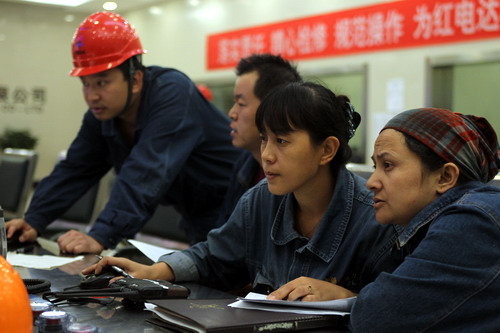Xinjiang's economy set to be transformed
Updated: 2011-09-15 13:45
By Cui Jia and Mao Weihua (China Daily)
|
|||||||||||
 |
|
Workers at the company conduct safety inspections. [Photo / China Daily] |
East and west
Zhang said doing business in Xinjiang comes with certain difficulties.
"Culture differences still exist between the east and west, and people need to be more open minded," he said. "The region is also short of skilled workers.
"Safety is another issue we cannot ignore. But I am sure as long as we keep helping local people to overcome unemployment and to improve their living standards, Xinjiang will become more and more stable, which is what everyone wants."
Hu Kaijiang, president of Shenhua Group's Xinjiang company, said the "children" of companies owned by the central government should recognize the historic responsibility given them by "mother": They must help Xinjiang to become more able to ensure its own prosperity, to be a place where residents can find work and to ensure that members of various ethnic groups live and work together in peace.
Others in the energy industry likewise see promise in the region.
From 2006 to 2010, Shenhua Group, a State-owned mining and energy corporation in China that produces more coal than any other company in the world, spent 12.4 billion yuan in Xinjiang. In the next five years, it plans to invest more than 10 times as much, increasing the investment amount to 134 billion yuan.
Also in the next five years, Shenhua will hire workers for more than 50,000 jobs throughout Xinjiang and contribute 10 billon yuan in taxes to the region.
"There is no doubt that the next five years will be when Xinjiang achieves its fastest development, since the central government is paying more attention to it than ever," Hu said. "This is important for the security and stability of both Xinjiang and China.
"The truth is State-owned enterprises need Xinjiang's resources and market and Xinjiang needs such companies to help the region and improve the living standards of people."
The importance to the rest of the country of Xinjiang's coal reserves and power production will only increase in the coming years, as parts of eastern China come close to depleting their energy resources.
"There will be many State-owned enterprises investing in the same things, which will force them to compete," Hu said.
Baosteel Group, a State-owned corporation that produces more steel than any other Chinese company, is also planning to spend large amounts of money in the region.
"Between 2011 and 2015, Baosteel Group will invest 41.8 billion yuan in Xinjiang Bayi Iron & Steel Co Ltd to boost its annual production capacity to 15 million tons and sales revenue to 70 billion yuan by 2015," said Xu Lejiang, president of Baosteel.
Jiang Jiemin, chairman of PetroChina, an oil company that made the largest profit of any State-owned Chinese enterprise in 2010, said PetroChina will invest 300 billion yuan into Xinjiang in the next decade. That amount is equal to the company's total investment in Xinjiang during the past 30 years.
Chinese nuclear-power and construction businesses are also paying a lot of attention to the region. The China National Nuclear Corp has agreed to undertake 15 billion yuan worth of projects, including the construction of the first stage of a 20-megawatt wind power project in Hami, a prefecture in northern Xinjiang.
Asked about a nuclear project, company officials said they have no plans in that direction. After Japan's Fukushima Daiichi reactor was hit by a tidal wave and began to leak radiation this year, China's State Council ceased approving nuclear power projects and has been conducting safety inspections of the nuclear power plants that now exist in the country.
Xinhua contributed to the story.














